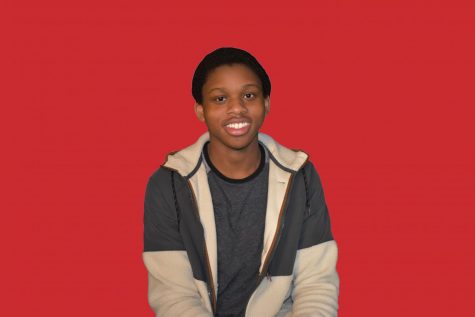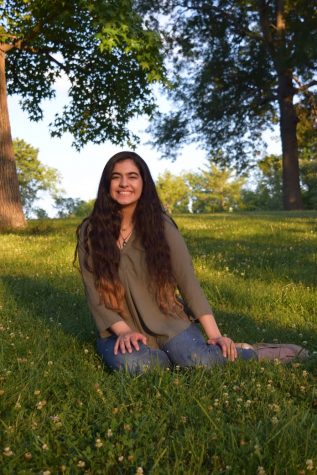As the time of sunset, “Maghrib,” grows closer, senior Farhan Hassan’s stomach growls at the thought of food; he looks forward to eating the dates and drinking the water in front of him.
During Ramadan, the ninth month of the Islamic calendar, Muslims refrain from eating and drinking from sunrise to sunset everyday for the entire month. The purpose behind this is for Muslims to recognize and appreciate their blessings and the food that they may take for granted on a daily basis.
“All across St. Louis, from the city [and] from the county, everybody just comes together to break our fasts and also to pray at night,” Hassan said. “I think that’s the biggest thing: [Ramadan] really brings that sense of unity.”
With abstinence from eating and drinking, Ramadan is a time for Muslims to work on self-improvement, spirituality and letting go of bad habits.
“Religiously, it’s a great time to take this opportunity to improve your faith,” junior Hanifa Mamajonova said. “We pray a lot, we pray “taraweeh” [nightly prayers], we read Quran [and] we do good things for others, like giving charity.”
Although freshman Salam Hadji is not required to fast with her condition, hypoglycemia, she fasts because she believes the benefits outweigh her diagnosis.
“Physically, at times, [fasting can be] really painful; I feel really hungry, [and] I don’t want to do it,” Hadji said. “But then, religiously, I know that I’m doing it for the sake of God. I’m also doing it to know how it feels for those in poorer countries, when they don’t have meals. It’s a reward whenever we get to eat because it’s like ‘wow, this is what people experience in developing nations.’ I try to focus on that more than my hunger.”
The Islamic calendar is set according the moon, meaning Ramadan begins 11 days earlier each year. For the past few years, Ramadan was regularly observed during the summer so most students are not familiar to fasting during the school year.
“[Ramadan being during school this year] is really annoying. The annoying thing isn’t tests because usually those are in the morning, like Advanced Placement (AP) tests,” sophomore Yusuf Hacking said. “The most annoying thing is studying because when it gets to be 5 p.m. and you’re just hours away from eating, it’s really difficult to focus at all. I don’t want to do anything then, so I usually just sleep or mindlessly watch YouTube videos. It’s the least productive I ever am, so studying is very difficult to do.”
Similarly, junior Mohammed Kuziez finds it difficult to adjust for times to study.
“It just makes me have to work more throughout the night and rest throughout the day,” Kuziez said. “[My sleep schedule] is going to be really messed up. I’m probably going to have to go home, stay up really late and then take my tests. Then, maybe sleep after school for a little bit.”
However, some students do not mind fasting during the school day.
“I don’t really see it as any different from any other Ramadan because I don’t think it really gets in the way of school at all,” Hassan said. “If anything, I think it helps me focus, and I think during Ramadan everyone is a lot more at ease and peaceful. [This] would help take stress off, if anything, while taking exams.”
According to Kuziez, despite the difficulties he encounters during Ramadan, its impact outweighs the negatives that he hopes improve his character in the future.
“I feel that I have more control over myself,” Kuziez said. “If I cannot do a basic function for 16 hours, I feel like I can discipline myself to study more for a few hours to do what’s necessary. Also, I feel that it can impact me in the future by helping spacing my work out better and to know my balance.”
For Hacking, Ramadan allows him to be more accountable for himself.
“It’s a humbling time of year where you don’t have the normal freedom to do the things that you usually do,” Hacking said. “It makes you more disciplined as a person.”

![Lined up outside of the theatre on the first Friday of Ramadan, junior Mohammed Kuziez and freshmen Waleed Abdulla and Areeb Hasan get together to pray “Jummah” (Friday prayers). Muslims are also obligated to pray five times a day, as “salah” (prayer) is one of the five pillars of Islam. “I like to think that I hold my religion very close to me; it's something that I was brought up on for the past 17 years,” Kuziez said. “It's one of the things that our religion holds the closest, and [prayer is] a basic [element] of it.”](https://pwestpathfinder.com/wp-content/uploads/2019/05/edited-900x600.jpg)



![Gazing up from the stage, junior Joseph McCurdy who played Peter Pan in the school play, Lost Girl, sits next to senior Juliana Rogers, who plays Wendy Darling, during a theater rehearsal. McCurdy’s passion for theater began when he observed a West High production in middle school. “I've been in the high school theater program since I was a freshman. I've always loved theater, but [what prompted me to join] was [when] I went to see [a performance here] when I was in middle school, and it was super cool,” McCurdy said.](https://pwestpathfinder.com/wp-content/uploads/2025/11/IMG_6535-1200x798.jpeg)

![Standing tall, stacked in a precise formation, the cheer team strikes a signature pose during halftime on Sept. 12 at the varsity football game. Nearly a month after this performance, the cheer team performed at the Missouri Cheerleading Coaches Association (MCCA) regional competition on Oct. 4, 2025. “We've all come [to] work together a lot more,” sophomore Elyssa Philippi said. “We're a lot closer than we were [earlier in the season] and going to state has made us closer [in] trying to work with each other, learn [new] skills and make our team better.”](https://pwestpathfinder.com/wp-content/uploads/2025/11/DSC5139-1.jpg)
![Handing out candy to excited trunk-or-treaters, President of the United Nations Children’s Fund club and junior Sara Ashok represents that group. Ashok was eager to participate in this event for multiple reasons. “I really wanted to be a part of the event because I get to help create memories for kids and spend time with my friends, spreading the things [I'm passionate about],” Ashok said.](https://pwestpathfinder.com/wp-content/uploads/2025/11/DSC_8648-1-1200x800.jpg)

![Smiling in a sea of Longhorns, Fox 2 reporter Ty Hawkins joins junior Darren Young during the morning Oct. 3 pep rally. The last time West was featured in this segment was 2011. “[I hope people see this and think] if you come to [Parkway] West, you will have the time of your life because there are so many fun activities to do that make it feel like you belong here. I was surprised so many people attended, but it was a lot of fun,” Young said.](https://pwestpathfinder.com/wp-content/uploads/2025/10/Edited2-1200x798.jpg)
![West High seniors and families listen as a representative of The Scholarship Foundation of St. Louis, Teresa Steinkamp, leads a Free Application for Federal Student Aid (FAFSA) workshop. This session, held in the library, provided guidance on financial aid, scholarships and student loan options. “This event is very beneficial for any seniors who are applying to or considering applying to colleges after high school [because] the cost of college is on the rise for seniors and parents,” college and career counselor Chris Lorenz said.](https://pwestpathfinder.com/wp-content/uploads/2025/09/DSC_4478-1200x778.jpg)
![Senior Kamori Berry walks across the field during halftime at the Homecoming football game on Sept. 12. During the pep assembly earlier that day, she was pronounced Homecoming Queen. “I thought it was nice that the crowd [started] cheering right away. I know [my friends] were really excited for me, and my family was happy because typically non-white people don't win,” Berry said.](https://pwestpathfinder.com/wp-content/uploads/2025/09/DSC7046-Enhanced-NR-1200x798.jpg)



